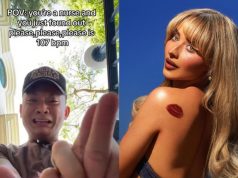
TikTok users will no longer be able to create videos with songs from Taylor Swift, Jon Batiste, boygenius and other Universal Music Group UMG.AS artists as the soundtrack, as contract negotiations between the two companies have collapsed.
TikTok’s access to Universal’s expansive roster of artists ended Wednesday, after months of negotiations failed to yield a new agreement with the world’s largest music company. TikTok has begun muting short videos featuring the label’s artists.
The high-profile dispute erupted as the music industry executives and artists gathered in Los Angeles for Sunday’s Grammy award ceremony.
“Our agreements with TikTok have expired because of TikTok’s unwillingness to appropriately compensate artists and songwriters, protect human artists from the harmful effects of AI, and address online safety issues for TikTok’s users,” a Universal spokesman said in a statement Thursday.
The label is asking TikTok to compensate artists a rate commensurate with what other social media platforms pay. Now, it accounts for only 1% of total revenue — though music is a core part of the experience on the app, Universal Music said in an open letter published Tuesday.
Universal Music also said TikTok is allowing the platform to be “flooded” with recordings generated by artificial intelligence, which dilutes the royalty pool for artists. It also raised concerns about “problematic content,” such as sexualized images of Billie Eilish, which reportedly went viral and were seen by millions of people before it was removed for violating community guidelines.
TikTok declined comment Thursday.
In an earlier statement, TikTok said Universal Music put “greed above the interests of their artists and songwriters.” The social video platform said the music label is walking away from its powerful promotional platform that reaches more than a billion users.
“TikTok has been able to reach ‘artist-first’ agreements with every other label and publisher,” TikTok said in its statement. “Clearly, Universal’s self-serving actions are not in the best interests of artists, songwriters and fans.”
On Thursday, Taylor Swift’s TikTok account, which has 23.9 million followers, displayed a notice that said “The music is currently unavailable.” The alert appeared under a tab that previously let users browse Swift’s songs.
TikTok published a report in November touting its role as a “launchpad for creating viral hits and breaking new artists.” Its Music Impact Report found that TikTok helped users discover music and connect with artists. It also reported that its users are more likely to use a paid music streaming services, creating value for the artists.
“Even though TikTok (formerly Musical.ly) has built one of the world’s largest and most valuable social media platforms off the backs of artists and songwriters, TikTok still argues that artists should be grateful for the ‘free promotion,'” Universal said.
Wall Street analysts praised Universal for the move. J.P. Morgan analyst Daniel Kerven said in a research note that the label “had little to lose and much to gain,” estimating it would lose less than $109 million from pulling off TikTok, which would be partially offset by users listening to music on competitor apps.
The muting of countless chart-topping songs has prompted shock among some young users, who use the music as background audio for TikTok trends.
One user named Alexa posted a slow motion video of herself shaking her head with a look of disbelief, adding the text “What do you mean they’re taking Taylor Swift’s music off of TikTok???”
It prompted some jokes that fans would have turn to Meta’s short-form video competitor, regarded by some as a less-cool version of TikTok.
“We have to move to (Instagram) Reels I fear,” one commentator posted.
— Reporting by Dawn Chmielewski in Los Angeles and Sheila Dang in Austin; Editing by David Gregorio









